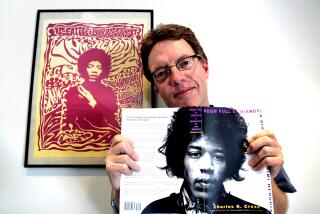The Epic Poet of Rock Criticism : PSYCHOTIC REACTIONS AND CARBURETOR DUNG <i> by Lester Bangs (Alfred A. Knopf: $19.95; 377 pp.) </i>
- Share via
The name Lester Bangs is unknown to the general reading public, but to those who write about rock music, it’s nothing short of legendary. Uneven, willfully perverse and self-involved to the point that he occasionally threatened to disappear into himself, Bangs was nonetheless one of the few rock critics who managed to elevate this vilified form of prose into the realm of literature.
Employing popular culture as a launching point for impassioned discourses on the essential moral conflicts that plague the human race, Bangs’ best writing had the epic scope of a great novel, and his accidental death five years ago of a drug overdose at age 34 ended a career of great promise.
This collection of pieces dating to 1971 is welcome but is also something of a disappointment. The book was edited by rock scholar Greil Marcus, a man lauded as a genius by some, dismissed by others as a crank egghead who grows ever more enmeshed in increasingly labyrinthine theories charting popular culture.
One can only wonder what his thinking was in the editing of “Psychotic Reactions,” which includes a few woefully weak pieces while omiting some of Bangs’ best work (his brilliant writing about Miles Davis, for instance).
Even at his worst, Bangs was head and shoulders above the rest of the pack. Well-read and intellectual (qualities he downplayed in his writing), Bangs was an anarchist afflicted with a crippling sensitivity that left him torn between empathy and rage. A hands-on journalist who dove into his assignments with the zeal of Hunter S. Thompson, Bangs maintained a thoughtful detachment that made him capable of sociological theorizing that Tom Wolfe would envy.
Bangs as a sociologist further outdistances Wolfe--who grows increasingly snooty and judgmental--in the generosity of spirit that informed everything he wrote. A raving populist who loathed the elitism of the privileged as much as he hated the ignorance of the lumpen prole, Bangs ultimately empathized with everyone--and in a sense, that may be what killed him. He was incapable of distancing himself from the pain he saw all around him.
A notoriously self-destructive substance abuser, Bangs was reportedly feeling optimistic and in better shape than he’d been in in years at the time of his death. Bangs’ friend and fellow critic, Richard Meltzer, however, sees things differently and describes this book as being about “Lester’s wish to die.”
The weight of Bangs’ unbearable alienation does grow increasingly oppressive as the book progresses, and the final chapters are downright grim. There’s none so bitter as the disillusioned idealist, and Bangs was nothing if not an idealist. He expected a lot out of life, and he gave a lot back. Some of the great things he gave can be found in this book.
More to Read
Sign up for our Book Club newsletter
Get the latest news, events and more from the Los Angeles Times Book Club, and help us get L.A. reading and talking.
You may occasionally receive promotional content from the Los Angeles Times.








